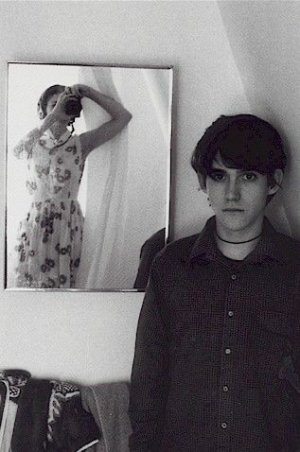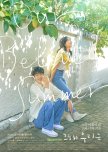Esta resenha pode conter spoilers
The Weight of Seasons
I delayed watching 'Our Beloved Summer' for nearly two years, initially dismissing it based on its trailer. At the time, I wasn't in the mood for a story about seemingly immature high schoolers entangled in trivial romances and breakups. However, watching it now, two years after its release, I realise that my earlier mindset might have prevented me from appreciating the drama’s true essence. Recently, I decided to give the trailer another look before diving into the series, and a particular detail caught my attention. Choi Ung, portrayed by Choi Woo Shik, was holding a copy of my favourite book, 'The Unbearable Lightness of Being.' This unusual choice for a romcom immediately signalled that 'Our Beloved Summer' was not your typical K-drama filled with clichéd conflicts between the main characters. The screenplay ingeniously incorporates the theme of eternal return, a pivotal concept in both the book and the drama. This philosophical thread, reminiscent of themes explored in 'Past Lives'—another stellar example of Korean storytelling—suggestively weaves together notions of destiny and interconnected fates, or what some might refer to as 'yoon-myeong' or the 'red string of fate.' This creative narrative choice not only sets the drama apart but also enriches its depth, making it a profoundly unique viewing experience.
Choi Woo Shik's portrayal of Choi Ung in 'Our Beloved Summer' masterfully subverts the conventional 'low-achiever' archetype often seen in dramas. Contrary to expectations, his character isn't compensated for academic shortcomings with a boisterous or charismatic persona—attributes typically assigned to such roles to bolster their likeability. Instead, Choi Ung is depicted as quiet, pensive, and introspective. Despite his youthful immaturity, there’s a depth to his demeanour that defies the usual clichés. Although deeply loved by his adoptive parents, Ung carries the weight of knowing he was adopted after the tragic loss of his parents' biological child. This knowledge, discovered early in his childhood without his parents' awareness, instills in him a profound sense of living a 'borrowed life.' This internal conflict is eloquently captured in his reflection: 'At times, nothing is the best you can do when you’re living a borrowed life.'
This sense of indebtedness and the fear of being inherently 'worthless' manifest in his aimlessness and aloof demeanour, despite the introspective qualities suggested by his eclectic book choices. Ung admits, 'Deep down, I was afraid that I might be a worthless person. That’s why I pretended not to know anything and that I wasn’t interested at all.' This confession reveals the layers of his internal struggle—how his academic disengagement and reserved nature are not merely personality traits but a protective facade against deeper fears of inadequacy.This thoughtful characterization not only challenges stereotypes but also adds a layer of authenticity to the narrative, making Choi Ung a relatable and compelling figure. His unique traits enrich the story, offering viewers a fresh perspective on what it means to be a protagonist in a youth-driven narrative.
One of the most poignant aspects of 'Our Beloved Summer' is its unflinching portrayal of poverty and its impact on personal relationships. A line from Kook Yeon Soo (Kim Da Mi) particularly resonates: 'I wish I was only poor to the point I could bear it. Please just for once.' This statement not only underscores the crushing weight of her financial struggles but also profoundly illustrates the emotional and psychological toll it takes on her. It’s a pivotal moment that clearly delineates the heartbreak and realism of her character’s journey, providing insight into the reasons behind her eventual breakup with Choi Ung. While Choi Ung is not exceptionally wealthy during college, his relative financial stability allows him the luxury of dreaming—a luxury Yeon Soo cannot afford as she is compelled to enter the workforce immediately after college, foregoing further education. This stark contrast in their circumstances breeds an inferiority complex in Yeon Soo, and understandably so. Her decision to end their relationship, driven by a fear of eventual resentment despite her love for Ung, is portrayed not as a failure on her part but as a painful act of self-preservation and practicality. Reflecting on their breakup years later, Yeon Soo labels her younger self as immature. However, from the perspective of her dire financial pressures, her choices appear both rational and sadly necessary.
The dynamic between Choi Ung and Kook Yeon Soo exemplifies a more nuanced approach to the 'enemies-to-lovers' trope. Unlike typical portrayals where stark opposites attract, their relationship is grounded in subtle yet profound similarities that make their bond both realistic and enduring. Both characters navigate their own forms of loneliness, insecurity, and a sort of premature maturity forced upon them by challenging childhoods. These shared experiences and traits—thoughtfulness, introversion, and a blend of immaturity coupled with wisdom beyond their years—forge a deep mutual understanding. This foundational connection is what makes their reunion, five years post-breakup, feel so natural and inevitable rather than forced. The concept of 'eternal return' woven throughout the drama doesn’t just recur in their fate but resonates deeply in their aligned personalities and past experiences. This thematic and emotional congruence ensures that their relationship stands the test of time, making their narrative not only compelling but also heartwarmingly authentic.
Additionally, the series delves into Kim Ji Ung's (Kim Sung Cheol's) poignant struggle with loneliness, accentuated by his unrequited love for both Yeon Soo and his emotionally distant mother. His role as a documentary producer, which compels him to observe life from behind his camera, initially appears as a safe detachment but increasingly becomes a suffocating cage. This metaphor of entrapment is profoundly illustrated when he chooses to film his dying mother—a decision intended to pave a path to reconciliation. However, this resolution doesn't evoke the sense of closure one might expect; instead, it leaves a lingering sense of sadness, as if the reconciliation is just another scene in his array of observed lives rather than a heartfelt connection. The character NJ (Roh Jeong Eui) also presents a compelling narrative, grappling with the dissonance between her public idol persona and her private identity. She finds an unexpected refuge in Choi Ung's art, which helps bridge her internal divides. Meanwhile, Yeon Soo’s evolution is equally significant. Her realisation towards the series' end, 'the only person who made my life seem pathetic was me,' marks a pivotal moment of self-acceptance. While her struggles with poverty initially isolated her, she eventually recognised the support system she always had in her friends and in Ung. This newfound acceptance and confidence enrich her character's journey, illustrating the transformative power of self-awareness and support.
'The documentary metaphor' that the series employs is especially striking, suggesting that it's the ordinary moments of our lives that compile our unique stories. This notion is beautifully encapsulated in the exchange, 'How pitiful,' 'Who?' 'Just us...us...and everyone...' It reminds us that while we may often feel trapped in the minutiae, it is these very moments that define and distinguish our lives. 'Our Beloved Summer' excels in portraying these subtle yet significant life experiences, making it a memorable and reflective drama.
Esta resenha foi útil para você?







